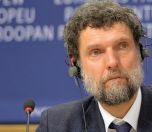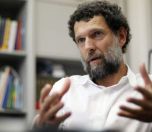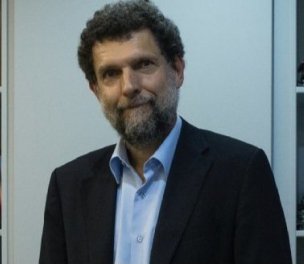Click to read the article in Turkish
Attorneys of Osman Kavala, a businessperson and a rights defender who has been arrested for nearly three-and-a-half years, held a press conference yesterday (March 24) to review the Constitutional Court's justified decision about a previous application by Kavala.
The court ruled in December that his arrest did not violate the right to personal liberty and security. The judgment was given by eight to seven votes.
The court's justified decision was published in the Official Gazette on Tuesday (March 23).
Referring to dissenting opinions by the seven members, one of which was the president of the Constitutional Court, the attorneys said, "Our most important expectation is that the strong and brave views expressed in the dissenting opinion have their place in the functioning of Turkey's judiciary."
"Despite the views of the president and six members that clearly demonstrate that the arrest is against our Constitution, the ECHR and the ECtHR norms, the majority have perpetuated rights violations with casual reasons..." said the attorneys.
The attorneys cited the following annotations in the justified decision:
• In Kafka's novel The Trial, Josef K. suddenly found himself in a spiral and labyrinth of law: 'Joseph K. was living in a state of law... all laws were firmly in force...' In our concrete case, the applicant being released twice and arrested three times on charges based on almost the same fact without the manifestation of important new pieces of evidence that would create strong suspicion resembles a Kafkaesque labyrinth of law." (Member Engin Yıldırım)
• ... the most important issue regarding the concrete application is that simple suspicion could not be demonstrated, let alone a strong indication, regarding the existence of the crime of political or military espionage, for which the applicant was arrested. (President Zühtü Arslan)
• ... the verdict of arrest and other investigation documents do not include any allegations, information, document or indication as to what is the state secret that was intended to be obtained by the perpetrator about, which institution's confidential information it was, and which executive actions were taken to obtain this information. (Deputy President Hasan Tahsin Gökcan)
• With such approaches, it may be possible to make allegations regarding people's sociological, anthropological, medical or legal studies on their societies or other societies that the nerve ends of societies were explored and that social-cultural secrets were shared with foreigners. As there will be no one left who cannot be charged with such an approach, when this logic is adopted, it will also be necessary to make allegations regarding people who participated in civil society activities in question. (Deputy President Hasan Tahsin Gökcan)
Trial of Osman KavalaBusinessperson Osman Kavala, who was on his way back from Antep, was taken into custody at İstanbul Atatürk Airport on October 18, 2017. On November 1, 2017, it was announced that Kavala was arrested on charges of "attempting to change the Constitutional order and to overthrow the government." In the official document referring him to court with a request of arrest, it was alleged that he was the head and financier of Gezi. The sixth and final hearing of the lawsuit filed into Gezi resistance was held at the İstanbul 30th Heavy Penal Court in Silivri on February 18, 2020. Announcing its ruling after the statements of defendants and their attorneys, the court board has ruled that Osman Kavala, Mücella Yapıcı, Can Atalay, Tayfun Kahraman, Ali Hakan Altınay, Yiğit Aksakoğlu, Yiğit Ali Ekmekçi, Çiğdem Mater Utku and Mine Özerden shall be acquitted as "there was no concrete and material evidence as to the committal of the offenses charged." The court has also ruled that businessperson and rights defender Osman Kavala, the only arrested defendant of the case, shall be released. Osman Kavala was the only arrested defendant in the 16-defendant Gezi Trial, which started on June 24, 2019. Having been acquitted in this trial, Kavala was arrested again, this time on charge of "political or military espionage." Kavala is still held in Silivri Prison in İstanbul. Announcing its ruling on Kavala on December 10, 2019, the ECtHR concluded that his rights were violated by his imprisonment. The ECtHR concluded that the European Convention on Human Rights was violated on the grounds that Kavala was arrested without any reasonable suspicion and with political motives and that the Constitutional Court did not examine his application within a reasonable period of time. This ruling became final on May 12, 2020. While this ruling has not yet been put into effect, the Committee of Ministers of the Council of Europe made a call to Turkey about the final ruling of the ECtHR and urged Turkey to implement the ECtHR's ruling of right violation and to release him. On the other side, the Constitutional Court added Kavala's file to its agenda on September 29, 2020; however, it then postponed the session where the individual application of Osman Kavala would be discussed. On the same day, it was announced that the indictment lodged by İstanbul Deputy Chief Public Prosecutor Hasan Yılmaz was presented to the İstanbul 36th Heavy Penal Court and accepted by the court. The new indictment prepared against Osman Kavala charged him with "obtaining state information that needs to remain confidential for political and military espionage purposes" and "attempting to overthrow Constitutional order." The indictment also alleged that Prof. Henri Barkey, an academic and a former US diplomat, "plotted" the July 2016 coup attempt. The first hearing of this trial was held on December 18 and the local court ruled for the continued imprisonment of Osman Kavala in its interim ruling. |
(HA/VK)




.jpg)





sa.jpg)

